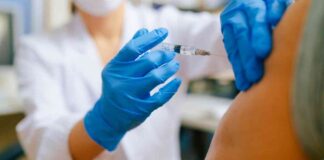Hugh Jackman Urges Sunscreen Use After Skin Cancer Scare
Australian actor Hugh Jackman recently took to Instagram to share a video revealing that he is currently dealing with a skin cancer scare. In the video, Jackman can be seen with a bandage on his nose, following two biopsies to determine the nature of the skin concern. He emphasized the importance of wearing sunscreen, especially as summer approaches in the Northern Hemisphere.
Jackman’s doctor indicated that the biopsies were conducted to assess the possibility of basal cell carcinoma, the most common type of skin cancer in humans. Basal cell carcinoma often develops on sun-damaged skin, making it crucial for individuals to protect their skin from harmful UV rays. Despite the potential diagnosis, Jackman reassured his followers that basal cell carcinoma is typically the least dangerous type of skin cancer and can be effectively treated.
The actor’s message serves as a poignant reminder for individuals to prioritize sun protection measures, such as wearing sunscreen, hats, and protective clothing, to reduce the risk of developing skin cancer. As Jackman highlighted, the desire for a tan is not worth the potential consequences of sun exposure, urging everyone to prioritize their skin health.
Promoting Sunscreen Use: A Personal Mission
This is not the first time that Hugh Jackman has used his platform to advocate for sunscreen use and skin cancer awareness. In 2013, the actor revealed that he had been diagnosed with basal cell carcinoma on his nose, prompting him to emphasize the importance of regular check-ups and sun protection practices. His proactive approach to sharing his experiences with skin cancer serves as a powerful reminder for individuals to prioritize their health and well-being.
Similarly, celebrities like Khloé Kardashian have also faced skin cancer scares, with the reality star undergoing biopsies for a suspicious bump on her cheek. Unlike Jackman, Kardashian has a history of melanoma, the most serious form of skin cancer, further underscoring the importance of early detection and prevention measures. These instances highlight the prevalence of skin cancer and the necessity of proactive skin care practices.
Understanding Basal Cell Carcinoma: Signs and Risk Factors
Basal cell carcinoma is a slow-growing type of skin cancer that primarily affects sun-exposed areas of the body. While it is highly treatable, early detection is key to successful management. Common warning signs of basal cell carcinoma include the presence of shiny, pink, or scaly bumps on the skin that may bleed or ooze fluid. Individuals with fair skin, a history of sun exposure, and a family history of skin cancer are at an increased risk of developing basal cell carcinoma.
Chronic exposure to UV radiation from the sun, particularly during childhood and adolescence, is a significant risk factor for developing skin cancer. The damage caused by UV rays can accumulate over time, leading to the development of skin lesions and potentially cancerous growths. By practicing sun safety measures, such as wearing sunscreen and protective clothing, individuals can reduce their risk of skin cancer and protect their skin from harmful UV rays.
The Role of Sunscreen in Skin Cancer Prevention
The use of sunscreen is a crucial component of sun protection and skin cancer prevention. By applying a broad-spectrum sunscreen with an SPF of 15 or higher, individuals can shield their skin from the harmful effects of UV radiation. Sunscreen should be reapplied every two hours, especially after swimming or sweating, to ensure continuous protection throughout the day.
In addition to sunscreen, wearing protective clothing, sunglasses, and seeking shade during peak sun hours can further reduce the risk of skin damage and skin cancer. Educating individuals about the importance of sun safety practices and regular skin cancer screenings can help promote early detection and prompt treatment of any suspicious skin lesions.
By incorporating sun protection measures into their daily routine, individuals can safeguard their skin against the harmful effects of UV radiation and reduce their risk of developing skin cancer. Prioritizing skin health and adopting proactive skin care practices can help individuals maintain healthy, radiant skin for years to come.


















